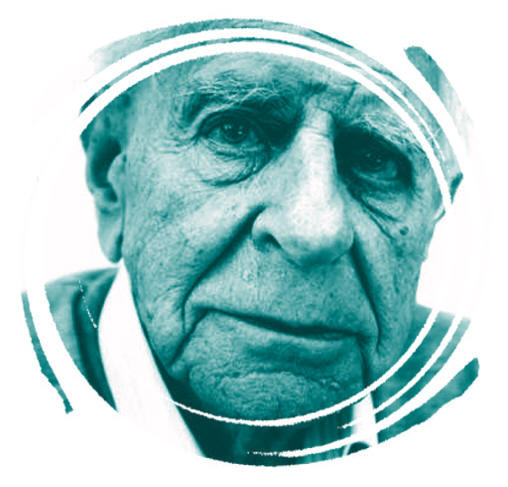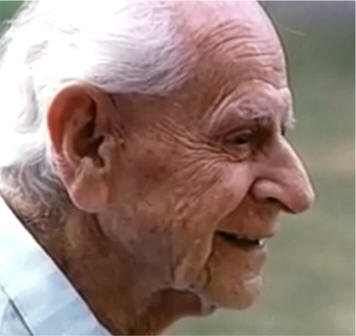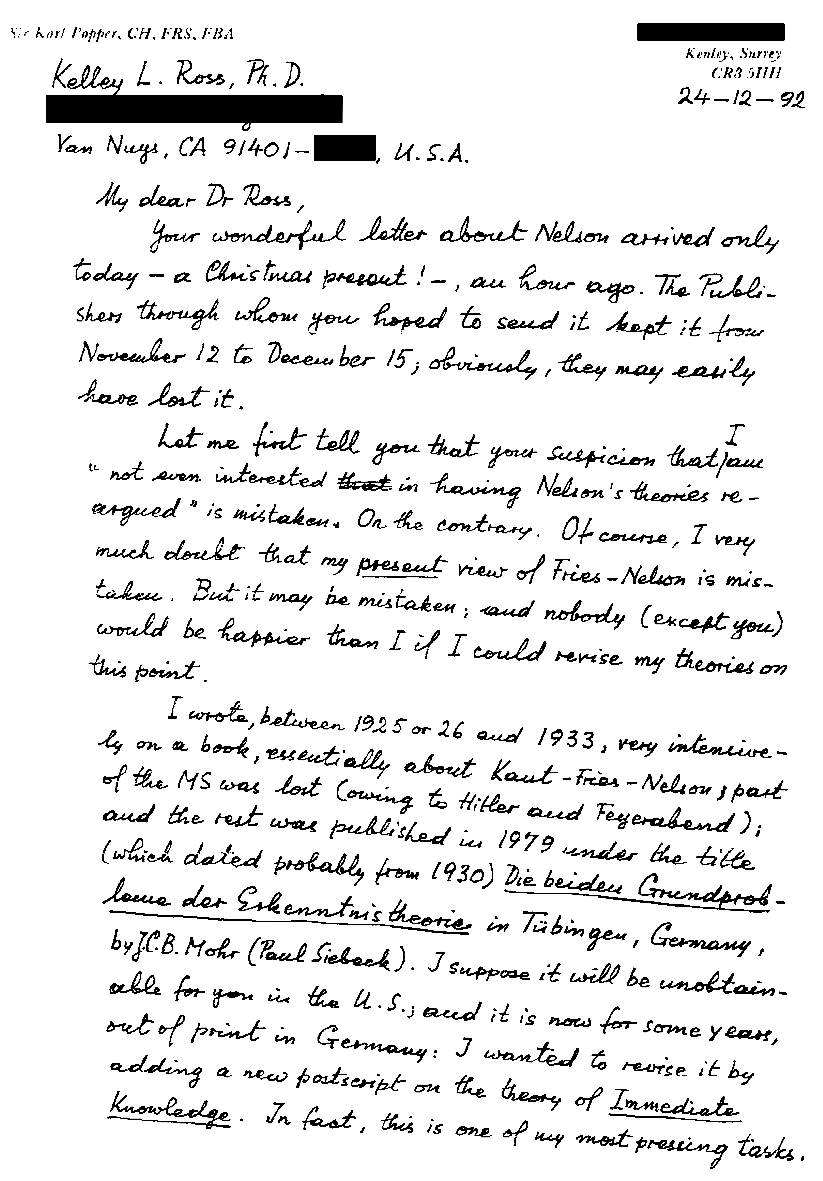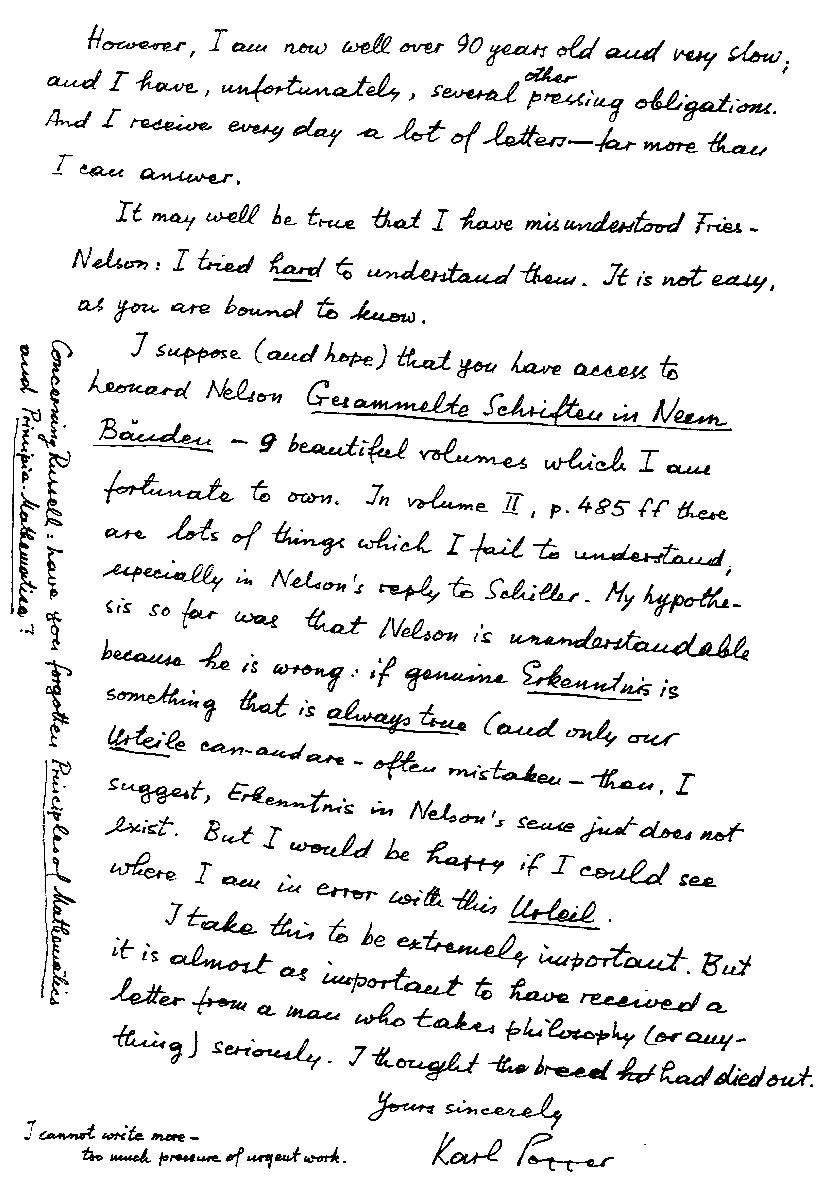|
KARL RAIMUND POPPER
welcome popper - pagina 1 - 2
È un comportamento arrogante tentare di portare il paradiso sulla terra in tal modo riusciremo solo
a trasformare la terra in un inferno dobbiamo abbandonare i nostri sogni di un mondo perfetto
In science we often learn from our mistakes . The aim of argument or of discussion should not be victory but progress .
Televisione la Tv dà alla gente ciò che la gente vuole ma questo non corrisponde all’idea di democrazia che è quella di far crescere l’educazione generale offrendo a tutti opportunità sempre migliori . ... Non ci dovrebbe essere alcun potere politico incontrollato in una democrazia . Ora è accaduto che questa televisione sia diventata un potere politico colossale, potenzialmente si potrebbe dire anche il più importante di tutti, come se fosse Dio stesso che parla . E così sarà se continueremo a consentirne l’abuso . Essa è diventata un potere troppo grande per la democrazia . Nessuna democrazia può sopravvivere se all’abuso di questo potere non si mette fine . Credo che un nuovo Hitler con la televisione avrebbe un potere infinito . -kp
Nel loro intero equipaggiamento per la vita, i bambini
sono attrezzati in modo da potersi adattare ai diversi ambienti che troveranno
attorno a loro. Essi sono percio dipendenti, in misura considerevole, nella loro
evoluzione mentale dal loro ambiente e cio che chiamiamo educazione e qualcosa
che influenza questo ambiente in un modo che giudichiamo buono per lo sviluppo
di questi bambini. Noi mandiamo i bambini a scuola perchE possano imparare
qualcosa. Ma che cosa significa realmente 'imparare'? E che cosa significa
'insegnare'? Significa influenzare il loro ambiente in modo che possano
prepararsi per i loro futuri compiti: il compito di diventare cittadini, il
compito di guadagnare denaro, il compito di diventare padri e madri per una
nuova generazione e cosI via. PerciO tutto dipende dall'ambiente, vale a dire
che, come generazione precedente, noi abbiamo la responsabilitA di creare le
migliori condizioni possibili. Ora, il punto E che la televisione E parte
dell'ambiente dei bambini ed una parte per la quale noi siamo ovviamente
responsabili, perche si tratta dell'ambiente fatto dall'uomo.
lei pensa allora che la televisione dovrebbe avere una funzione educativa? https://thevision.com/cultura/cattiva-maestra-televisione-popper
Chi controlla l'informazione televisiva controlla la democrazia
televisione - cattiva maestra . una democrazia non può esistere se non si mette sotto controllo la televisione più precisamente non può esistere a lungo fino a quando il potere della televisione non sarà pienamente scoperto dico così perché anche i nemici della democrazia non sono ancora del tutto consapevoli del potere della televisione ma quando si saranno resi conto fino in fondo di quello che possono fare la useranno in tutti i modi anche nelle situazioni più pericolose ma allora sarà troppo tardi
https://youtu.be/sLDpj8dx0UU - KP clips 1974
Popper nel ventesimo secolo ha ricalcato la sua idea di democrazia sulle forme di quella greca prima (l’Atene periclea per intenderci), e di quella latina poi: quel ubi societas ibi ius che ancora oggi si insegna tra i banchi universitari. Una società che, secondo il filosofo, oggi non può non essere aperta a più visioni del mondo, etiche e filosofiche, politiche e quindi religiose. Chi ha ben chiaro questo insegnamento, non può dunque affrancare quale legittima una morale e i suoi valori, almeno non senza danneggiare la libertà degli altri. Un’idea di tolleranza che non deve confondersi con i principi dell’etica cristiana, ma con quelli laici, dai tempi di Locke fino ai giorni nostri.
opinione.it
Popper's Open Society After Fifty
Years 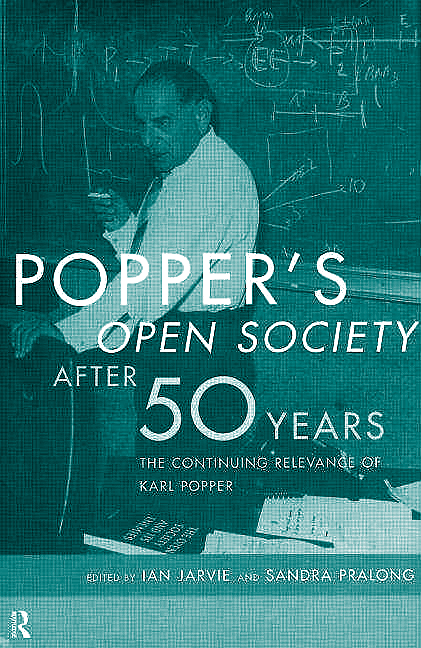 ublication in 1945, as well as applying
some of its principles to the context of modern Eastern Europe. ublication in 1945, as well as applying
some of its principles to the context of modern Eastern Europe.This unique volume contains papers by many of Popper's contemporaries and friends, including such luminaries as Ernst Gombrich, in his paper 'The Open Society and its Enemies: Remembering its Publication Fifty Years Ago'. routledge.com . A society - a way of living together - based upon the idea of not merely tolerating a man and his convictions but of respecting him and his convictions - is the sort of society I call an 'open' society . .
It is one's duty to be an optimist .
Only from this point of view can one be active and do what one can.
If you are a pessimist, you have given up. We must remain
optimists, we have to look at the world from the point of view of how
beautiful it is, and to try to do what we can to make it better . fb/kp
One can abuse the freedom of speech and of the press, for example, by
giving out false information or by instigating a revolt . In just the same
way, the state power can abuse any limitation of freedom . fb/kp
Yes, despite all this I remain an
optimist toward the world . It is one's duty to be an optimist
. Only from this point of view can one be active and do what
one can . If you are a pessimist, you have given up .
We must remain optimists, we have to look at the world from the point of
view of how beautiful it is, and to try to do what we can to make it
better . AFTER THE OPEN SOCIETY
The position between optimism and
pessimism which I am trying to establish may be briefly described as follows. ...
To be an individualist means to see in every human
individual an end in itself, and not merely a means to further other
interests, for example, those of the state . It does not mean
to take one's own individuality particularly seriously, or to lay more
stress - or even as much - on one's own interests than on the interests of
others. ... Only in an open society, in a society which tolerates and respects many views and many opinions, can we hope to learn from our mistakes and so get nearer to the truth.
It is therefore no accident that Western Society is
the only known society in which science has really flourished. And it has
not merely flourished, it is here that science has first become the basis
of economic life. Only in an open society is science unfettered.
Admittedly, a closed society which is forced to compete with an open
society is likely to allow its scientists a degree of freedom which is
needed to avoid economic stagnation (or defeat in the armaments race). But
though it may extol science for its service to the state, it will always
be suspicious of it. For science is no respecter of any dogma or authority
and it cannot, in the long run, respect the totalitarian or authoritarian
dogma which forms the basis of any closed society.
the open society and the democratic state -
after the open society Agreement is comparatively unimportant in the search for truth: we may easily both be mistaken. People did strongly agree, for a very long time, on many erroneous doctrines (such as the Ptolemaic system of the world); and agreement is often the result of the fear of intolerance, or even of violence. ...
What is
toleration ? It
is a necessary consequence of our being human. We are all products of
frailty: fallible, and prone to error. So let us mutually pardon each
other's follies. This is the first principle of the law of nature, the
first principle of all human rights. ...
Democracy consists in the control of political
power. That is the main pont of a democracy.
.
The member of a free society and citizen of a free state
has certainly a duty of loyalty to the state, because the existence of the state
is essential for the continuance of the society, and he will serve the state
when the need arises. And yet, it is also his duty to combine with his loyalty a
certain degree of vigilance, and even a certain degree of distrust of the state
and its officers: it is his duty to watch and see that the state does not
overstep the limits of its legitimate functions. For the institutions of the
state are powerful, and where there is power there
is always the danger of its misuse – and a danger
to freedom. All power has a tendency to entrench itself, and a tendency to
corrupt; and in the last resort it is only the traditions of a free society –
which includes a tradition of almost jealous watchfulness on the part of its
citizens – which can balance the power of the state by providing those checks
and controls on which all freedom depends.
For those who have eaten of the tree of knowledge
paradise is lost economic power must not be permitted to dominate political power if necessary, it must be fought and brought under control by political power the open society and its enemies
the open society and its enemies
https://youtu.be/VTFcNDJqyts - Karl Popper and Justified True Belief we could then say that rationalism is an attitude of readiness to listen to critical arguments and to learn from experience . It is fundamentally an attitude of admitting that ' I may be wrong and you may be right, and by an effort, we may get nearer to the truth ' . ... Thus we might say : help your enemies; assist those in distress, even if they hate you; but love only your friends . ...
now the adoption of an anti-equalitarian
attitude in political life, i.e. in the field of problems concerned with
the power of man over man, is just what i should call criminal .
for it offers a justification of the attitude that different categories of
people have different rights; that the master has the right to
enslave the slave; that some men have the right to use
others as their tools. ultimately, it will be used,
as in plato, to justify murder . .
I NEMICI DELLA SOCIETA' APERTA La pratica non è il nemico della conoscenza teorica ma il suo più valido incentivo. Benché una certa dose di disinteresse si addica allo scienziato, ci sono molti esempi che dimostrano che non è sempre importante per uno scienziato essere così disinteressato. Ma è importante per lui restare in contatto con la realtà, con la pratica, perché coloro che la trascurano ne pagano il fio cadendo nello scolasticismo. la società aperta e i suoi nemici . Reason, like language, can be said to be a product of social life. A Robinson Crusoe (marooned in early childhood) might be clever enough to master many difficult situations; but he would invent neither language nor the art of argumentation. Admittedly, we often argue with ourselves; but we are accustomed to do so only because we have learned to argue with others, and because we have learned in this way that the argument counts, rather than the person arguing. (This last consideration cannot, of course, tip the scales when we argue with ourselves.) Thus we can say that we owe our reason, like our language, to intercourse with other men. ... man has created new worlds - of language - of music - of poetry - of science - and the most important of these is the world of the moral demands - for equality - for freedom and for helping the weak . the open society and its enemies - cap 5 ...
ON THE PARADOX OF TOLERANCE We should therefore claim, in the name of tolerance, the right not to tolerate the intolerant. Dovremmo rivendicare, nel nome della tolleranza, il diritto a non tollerare gli intolleranti . We should claim that any movement preaching intolerance places itself outside the law, and we should consider incitement to intolerance and persecution as criminal, in the same way as we should consider incitement to murder, or to kidnapping, or to the revival of the slave trade, as criminal. ... To educate oneself so as to adopt an attitude of scepticism towards one's causal theories, and one of intellectual modesty, is, without doubt, one of the most important moral duties . ...
only by planning step by step for institutions to
safeguard freedom - especially freedom - from exploitation can we hope to
achieve a better world .
...
We can never return to the alleged innocence and
beauty of the closed society. Our dream of heaven
cannot be realized on earth. Once we begin to rely upon our reason, and to
use our powers of criticism, once we feel the call of personal
responsibilities, and with it, the responsibility of helping to advance
knowledge, we cannot return to a state of implicit submission to tribal
magic .
chapter 10
...
In all matters, we can only
learn by trial and error,
by making mistakes and improvements; we can never rely on inspiration,
although inspirations may be most valuable as long as they can be checked
by experience.
...
we can discover the fact that we had a prejudice
only after having got rid
of it .
...
Reason, like science, grows by
way of mutual criticism; the only possible way of 'planning' its growth is
to develop those institutions that safeguard the freedom of this
criticism, that is to say, the freedom of thought.
...
We should realize that from the moral point of view
suffering and happiness
must not be treated as symmetrical; that is to say, the promotion of
happiness is in any case much less urgent than the rendering of help to
those who suffer, and the attempt to prevent suffering.
...
The theory that the human
race might live a little longer if it had not made the
fatal mistake of helping the
weak is most questionable; but even if it
were true - is mere length of survival of the race really all we want? Or
is the almost perfect man-beast so eminently valuable that we should
prefer a prolongation of his existence (he did exist for quite a long
time, anyway) to our experiment of helping the weak?
...
Those who prefer
one step towards a
distant ideal to the realization of a piecemeal compromise should always
remember that if the ideal is very distant, it may even become difficult
to say whether the step taken was towards or away from it.
the open society and Its enemies - fb/kp
-
books.google.be
.
Io sostengo che una delle
caratteristiche di una società aperta sia di tenere in gran conto, oltre
alla forma democratica di governo, la libertà di associazione, e di
proteggere e anche incoraggiare la formazione di sotto-società libere,
ciascuna delle quali possa sostenere differenti opinioni e credenze.
kp
la Società Aperta è aperta a tutti tranne che
agli intolleranti
If we are not prepared to defend a tolerant society
La tolleranza illimitata porta alla scomparsa della tolleranza
Se estendiamo l'illimitata tolleranza anche a coloro che sono intolleranti
e se non siamo disposti a difendere una società tollerante contro gli
attacchi degli intolleranti
allora i tolleranti saranno distrutti e la tolleranza con essi
.
***
-- La
dittatura è moralmente cattiva perché condanna i cittadini dello Stato,
contro la loro migliore coscienza, contro il loro convincimento morale, a
collaborare con il male se non altro con il silenzio. Essa solleva l'uomo dalla
responsabilità morale senza la quale è solo la metà, un centesimo di uomo. Essa
trasforma qualsiasi tentativo di portare la propria responsabilità umana in un
tentativo di suicidio --
la lezione di questo secolo - 1992
***
Errore che è alla base dell’individuo
libero
“è libero chi non si limita ad
agire a casaccio, ma controlla i risultati dei suoi tentativi casuali, e perciò
apprende dai suoi errori, e in più, mira esplicitamente a trovare le falle delle
proprie provvisorie soluzioni”.
liceopertini.net
vialattea.net
Karl Raimund Popper
Il famoso filosofo critica Marx , Hegel e Platone che
“estraggono conigli fisici da cappelli puramente metafisici”.
Per lui l’unica
cosa che si può fare nella vita reale è quella di
migliorare le condizioni di lavoro, renderle meno faticose e più degne
dell’uomo, in modo tale da ottenere più tempo libero. E poi, Popper non
accetta la sfiducia di Marx nella possibilità di modificare le cose attraverso
gli strumenti legali, della politica e della democrazia. E ancora: “Chi
controlla i controllori?” Marx non se lo chiede mai. La questione non è: “Quali
devono essere i governanti?” Il vero problema è: “Come possiamo controllarli?”.
Popper disse anche questo: “La Tv dà alla gente ciò che la gente vuole, ma
questo non corrisponde all’idea di democrazia, che è quella di far crescere
l’educazione generale offrendo a tutti opportunità sempre migliori”. Infine per
Popper è inammissibile perdere la testa in gruppo.
È molto meglio
sbagliare da soli.
damiano mazzotti - italiacittadini.net -
agoravox.it
KARL RAIMUND POPPER
1902-1994
ogni
teoria verra' assunta come vera sempre e solo
provvisoriamente
Contesto Storico
Il pensiero Popper, considerato uno dei fondatori
della moderna epistemologia, sviluppa la critica humiana del procedimento induttivo, secondo la
quale non è possibile una conclusione universale partendo dall’analisi di un numero finito di casi
particolari. Egli conclude che, se è vero che un certo
numero di esempi confermati non possono garantire
la verità di una proposizione universale, è
altrettanto vero che basta un solo caso contrario
per dimostrarne la falsità ...
"Noi, gli intellettuali, abbiamo provocato i danni più terribili. Lo sterminio
di massa in nome di un’idea, di una dottrina, di una teoria, questa è nostra
opera, la nostra invenzione: invenzione di intellettuali. Se noi la smettessimo
di aizzare gli uomini gli uni contro gli altri - spesso con le migliori
intenzioni - anche solo con questo si sarebbe raggiunto un grande risultato.
Nessuno può dire che questo è impossibile per noi".
ada cortese - panteca.com
http://plato.stanford.edu/entries/popper
lettera a
kelley l.ross ph. d.
www.friesian.com/ross/popper.htm
...
The solution to the antinomies was the
view that phenomenal objects were not things in themselves, which Popper
evidently did not want to accept. And the argument of Nelson's "Impossibility
of the Theory of Knowledge" was simply that a theory of knowledge cannot
prove that knowledge exists, for it would have to presuppose the possibility that the existence or non-existence of knowledge could be
known, which
would beg the question ...
.
Certainty is rarely objective
it is
usually no more than a strong feeling of trust, of conviction, although
based on insufficient knowledge. Such feelings are dangerous since they
are seldom well-founded. Strong feelings of conviction make dogmatists
of us. They may even turn us into hysterical fanatics who try to
convince themselves of a certainty which they unconsciously know is not
available.
karl
popper
is
generally regarded as one of the greatest philosophers of science
of this century. He was also a social and political philosopher
of considerable stature, a self-professed 'critical-rationalist',
a dedicated opponent of all forms of scepticism, conventionalism,
and relativism in science and in human affairs generally, a
committed advocate and staunch defender of the 'Open Society',
and an implacable critic of totalitarianism in all of its forms.
One of the many remarkable features of Popper's thought is the
scope of his intellectual influence. In the modern technological
and highly-specialised world scientists are rarely aware of the
work of philosophers; it is virtually unprecedented to find them
queuing up, as they have done in Popper's case, to testify to the
enormously practical beneficial impact which that philosophical
work has had upon their own. But notwithstanding the fact that he
wrote on even the most technical matters with consummate clarity,
the scope of Popper's work is such that it is commonplace by now
to find that commentators tend to deal with the epistemological,
scientific and social elements of his thought as if they were
quite disparate and unconnected, and thus the fundamental unity
of his philosophical vision and method has to a large degree been
dissipated. Here we will try to trace the threads which
interconnect the various elements of his philosophy, and which
give it its fundamental unity.
ul.ie/~philos/vol1/popper.html -
pyke-eye.com -
escapeartist.com -
eeng.dcu.ie -
emsf.rai.it
Sir Karl Raimund Popper was an Austrian and British philosopher and a professor
at the London School of Economics
Popper was born in
Vienna of Jewish parents. Before attending the University of Vienna, he briefly became a Marxist and
also familiarised himself with the psychoanalytic theories of Freud and Adler. At about the same time,
he attended a lecture given by Einstein on relativity theory, which greatly impressed him.
bbc.co.uk
www.thefamouspeople.com/profiles/karl-popper-235.php
Dario Antiseri
CHE ingombrante il suo libro,
professor Popper
Veniva
dall’università di Padova. Era il suo primo anno a Roma, come docente di
filosofia della scienza, e doveva avere più di cinquant’anni. Era
Dario Antiseri.
Tredici anni prima era riuscito, testardo come la sua gente, a far pubblicare in
Italia l’opera politica più importante di
Popper
- La società aperta e i suoi nemici
... La
storia di Antiseri e Popper, per chi era quel giorno di quasi vent’anni fa alla
Luiss, segna lo scorrere del tempo. Hanno visto cose, allora, difficili da
immaginare
ideazione.com
Karl Popper quando
Wittgenstein lo minacciò...
La posizione di Popper nei confronti della metafisica non mancò di suscitare
perplessità tra i neopositivisti. Queste critiche, però, non turbarono Popper,
il quale, a cominciare dal 1949 se non prima, usò nelle sue lezioni
l'espressione «programma di ricerca metafisico». Nel frattempo, all'inizio
dell'anno accademico 1946-47, Popper aveva ricevuto un invito dal segretario del
Moral Sciences Club di Cambridge perché leggesse un saggio su di qualche
«perplessità filosofica». «Era chiaro - scrive Popper nella sua autobiografia
intellettuale La ricerca non ha fine - che si trattava di una formulazione di
Wittgenstein, secondo la quale in filosofia non esistono problemi genuini, ma
soltanto perplessità linguistiche». Decisamente contrario a questa tesi, Popper
accettò la sfida; scelse di parlare sul tema "Ci sono problemi filosofici?"; e
iniziò il suo discorso, in modo un po' scherzoso, facendo presente che, negando
l'esistenza di problemi filosofici, chiunque avesse scritto l'invito, aveva
preso posizione su di una questione creata da un genuino problema filosofico.
«Ma proprio a questo punto - ricorda Popper - Wittgenstein saltò su e disse, ad
alta voce e così mi parve, con rabbia: "Il Segretario ha. fatto esattamente ciò
che gli è stato detto di fare. Egli ha agito su mia istruzione". Io non ci feci
caso, e continuai; ma accadde che almeno alcuni fra gli ammiratori di
Wittgenstein, tra i presenti, se ne accorsero, e di conseguenza presero la mia
osservazione, intesa come uno scherzo, come un grave rimprovero al Segretario».
larepubblica
gndesign.it/popper/interviste.htm
LIBERALE O SOCIALDEMOCRATICO ?
Karl Raimund Popper è stato uno di pochi filosofi che nel
ventesimo secolo hanno resistito alle 'seduzioni
del totalitarismo di destra e di sinistra' - ciò,
sin dal rientro dall’emigrazione, nel 1946, alla London School of Economics, gli
ha consentito di maturare un prestigio e un’autorità morale, tali da indurre
molti leader politici a recarsi da lui per riceverne consigli.
Ricapitolando
Popper
dice che
il valore più importante è la libertà, che egli afferma in campo politico in
evidente contrasto con la situazione storica dell’epoca -
totalitarismi - e
che egli fa risalire, intervenendo nella disputa tra deterministi e indeterministi
come fece anche il biologo francese Jacques Monod nella sua
opera “Il caso e la necessità” direttamente al metodo di riproduzione della
vita tramite il DNA .
Vediamo nascere infinite forme viventi
molto
diverse l’una dall’altra ma tutte con la stessa struttura del DNA.
È così
che la vita stessa ha in qualche modo inventato la creatività
che è
libertà .
liceopertini.net
“Da parecchi anni si va sviluppando con grande successo
una propaganda ideologica secondo la quale noi, cioè le democrazie occidentali,
viviamo in un mondo abominevole – affermava Popper – Questa propaganda è
semplicemente una menzogna. (…) Non viviamo in un mondo ideale, me è comunque il
migliore, il più giusto che abbiamo mai costruito. Viviamo nella società più
libera che sia mai esistita. E dirlo non è un delitto. (…) Non ci sarà mai un
mondo completamente giusto, di uguali. Ma finora sembra che libertà e
uguaglianza siano due cose opposte: come se per cercare di introdurre
l’uguaglianza fosse necessario imporla con la forza, cioè con la perdita di
libertà. Si può certo fare di tutto per arrivare a una maggiore uguaglianza.
Personalmente, però, non credo più, come una volta, che l’uguaglianza sia tanto
importante.
Se non c’è nessuno che muore di fame, poco importa che qualcuno sia ricchissimo.
Perché no? Nel movimento a favore dell’eguaglianza c’è un elemento piuttosto
sgradevole, e cioè l’invidia nei confronti del ricco. Lo ripeto, dovremmo essere
tutti contenti di vivere nel mondo in cui viviamo”.
VITA
Karl Raimund Popper - Vienna, 1902 - Londra, 1994
fece, ancor giovanissimo,
diverse esperienze intellettuali (fisica, matematica, musica, politica),
lavorando per un certo periodo presso la clinica per l'infanzia di Alfred Adler.
Si laureò in filosofia nel 1928, iniziando a lavorare come insegnante di
matematica e fisica nella scuola media.
Ebbe stretti rapporti con il
ildiogene.it
Ogniqualvolta muore un uomo
welcome popper
- pagina
1 -
| |||||||
